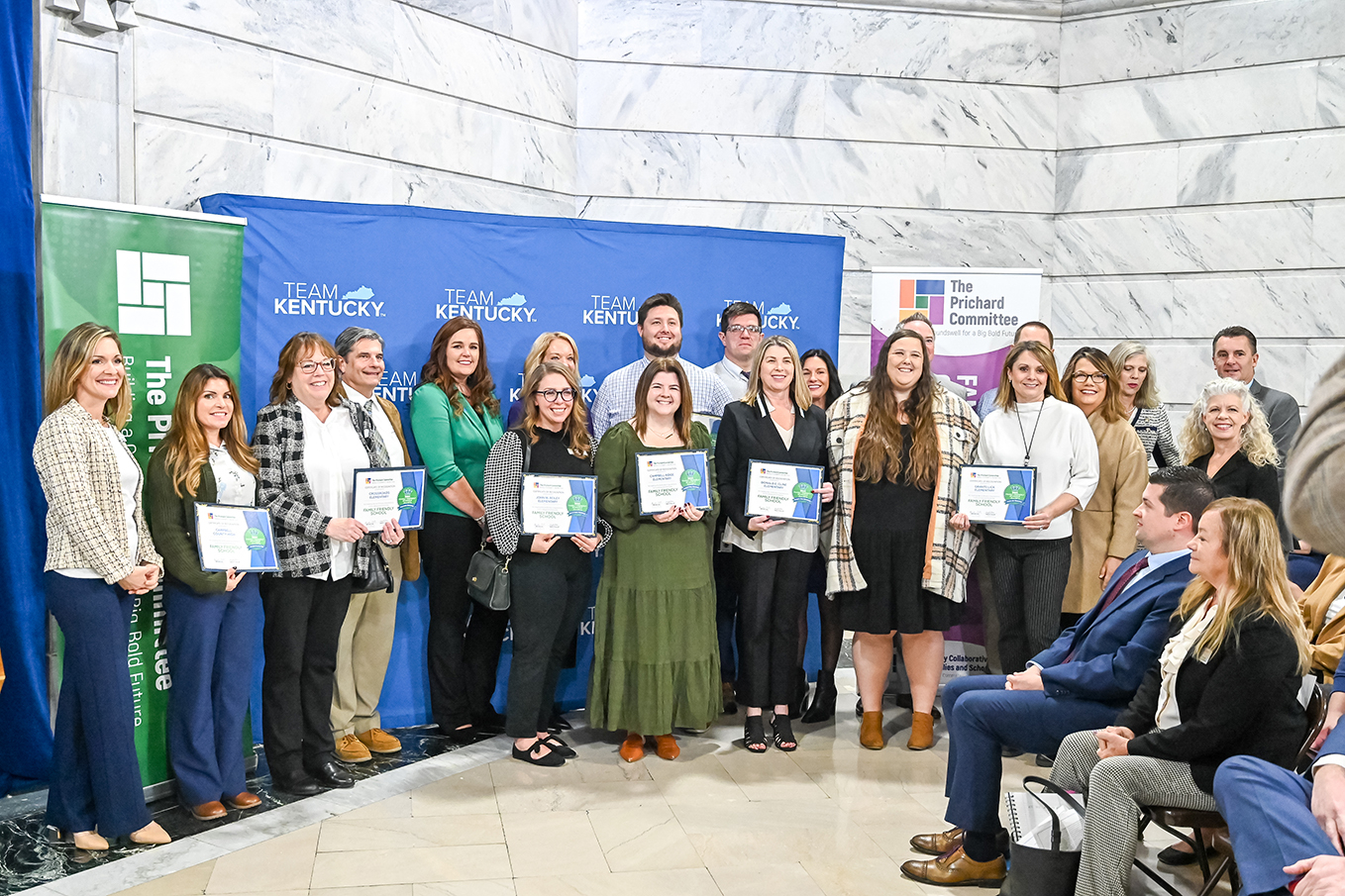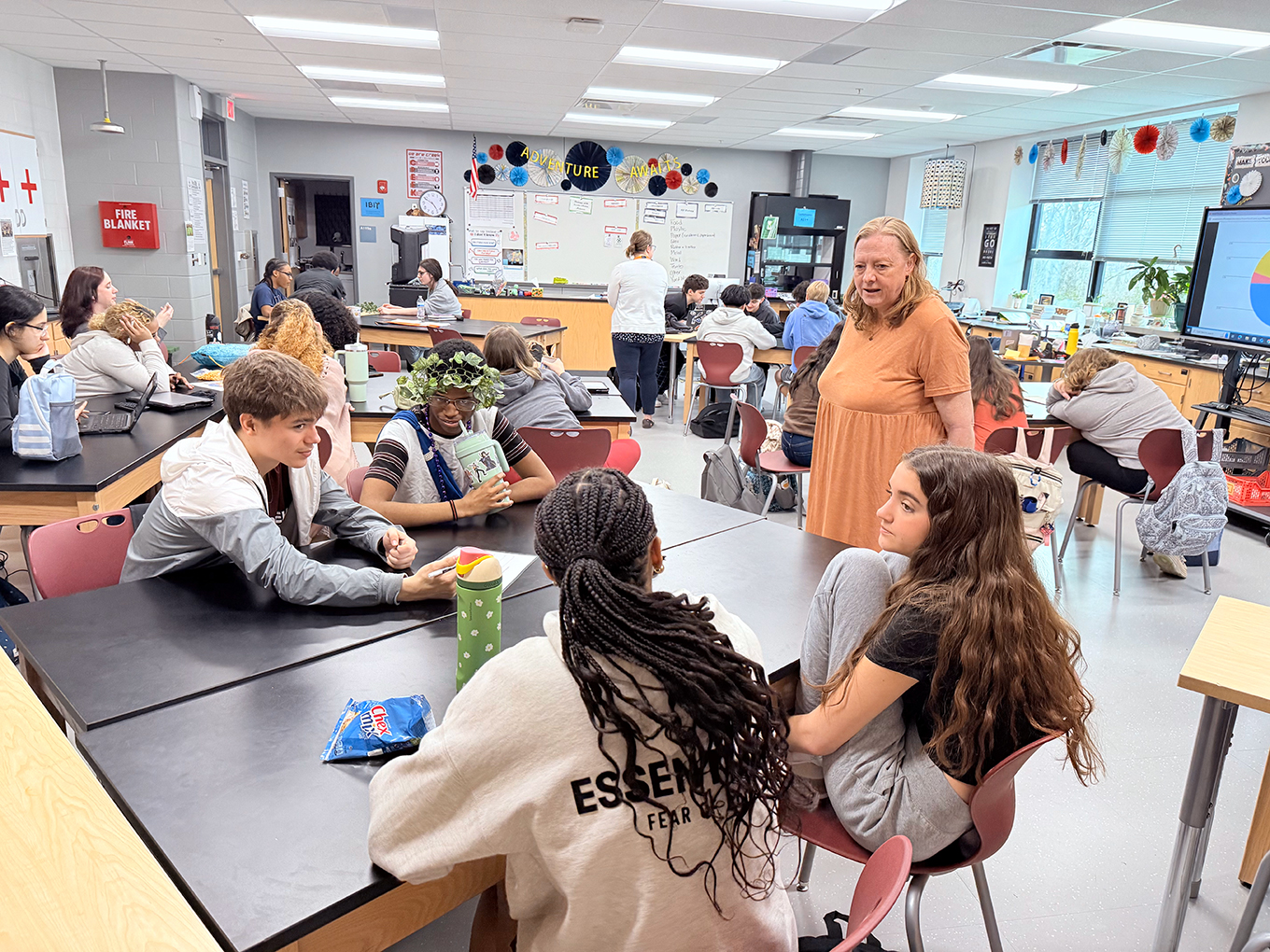
Kentucky High School Teacher of the Year Allison Hunt reviews for a final exam with students in her AP Human Geography class at DuPont Manual High School (Jefferson County).
Photo by Amy Wallot, Dec. 17, 2012
What is Human Geography? That is a question I am frequently asked when I tell people that I teach Advanced Placement Human Geography. I have often jokingly told people that Human Geography is the new name for anatomy. Human geography entails pretty much all aspects of life. It is about people and how the physical environment and interactions with others shape societies. Unlike some geography courses of the past, human geography is not about simple place location; instead it goes much deeper into the successes and struggles of various societies (including our own).
My love of geography developed at an early age. My family enjoyed a wide variety of family trips. As we traveled, I encountered people doing different economic activities and living in different types of houses, and I heard different kinds of music and enjoyed different kinds of food. Those experiences resulted in a curiosity regarding reasons behind cultural differences. Those questions are still the basis of my approach to geography today.
The study of human geography became profoundly personal to me as I went through the process of adopting my two youngest children from Russia. The differences in governments, cultural perspectives, languages, historical backgrounds, urban and rural landscapes, population issues and physical geography were better understood and appreciated due to my geography background. When the action of an American sending her adoptive child back to Russia threatened our receipt of a court date, I was panicked, but still better equipped to comprehend the political wrangling and perceptions of both sides. Russia is a very interesting and complex country, steeped in its own history and tradition, and I will continue to help my boys understand the culture of their native country as they grow older. In the meantime, I enjoy passing along my family’s tradition of family vacations and exploration. Explaining to my sons the different physical features of Earth and how human beings interact with their physical environment is exciting and fulfilling.
Geography education is essential to the education of our students at all levels. Often, discussions about how to create 21st-century learners merely involve technology. While modern technology is a valuable tool that enables us to interact with others and explore places in new ways, it is the development of an understanding of societies that is really essential to success in our increasingly interconnected world. There is great value in simply analyzing a map – be it electronic or paper. As journalist Robert Kaplan said, “If you want to know what Russia, China or Iran will do next, don’t read their newspapers or ask what our spies have dug up — consult a map. Geography can reveal as much about a government’s aims as its secret councils. More than ideology or domestic politics, what fundamentally defines a state is its place on the globe.”
Geography is all around us, if we open our eyes. As a result, geography isn’t a topic that needs to or should be exclusively relegated to the frontier of social studies courses. Instead, it is part of us experiencing life with intellectual curiosity. It simply boils down to critically questioning the reasons for and impact of the patterns that exist in the world around us. All problems we face are, at their root, geographic problems – from where to lay fiber optic cables to how to minimize our environmental impact to ethnic conflicts. A firm base in geographic literacy will result in more effective solutions to the issues we currently face and will face in the future.
The natural curiosity and love of learning exhibited by my own children is equally present in my students. I get to teach every day, at home and at school, about our world and the various cultures that help define it. My passion is to help increase awareness of the world in which we live and to celebrate the successes of people everywhere. I am thankful that I have the daily opportunity to help motivate, teach and inspire students as they grow into enlightened, participatory and passionate lifelong learners who are truly equipped to interact with our increasingly global society. Don’t forget to look at the world around you and ask questions.
Allison Hunt, an AP Human Geography teacher at Manual High School in Jefferson County, was selected as the 2013 Kentucky High School Teacher of the Year on Oct. 17, 2012. This is her first column for Kentucky Teacher. She and Heidi Givens, the Kentucky Elementary School Teacher of the Year, will alternate monthly column-writing duties throughout their reigns. Their columns will run the last Thursday of each month.




Interesting word for human geography: Demonyn. See the linked Wikipedia entry.
A demonym (pron.: /ˈdɛmənɪm/), also referred to as a gentilic, is a name for a resident of a locality. A demonym is usually, though not always, derived from the name of a locality;[1] the demonym for a resident of Britain is Briton, and the demonym for a resident of Turkey is Turk. Yet the most common English language demonym for the people of the Netherlands is Dutch (though the word Netherlander is also used).
http://en.wikipedia.org/wiki/Demonym